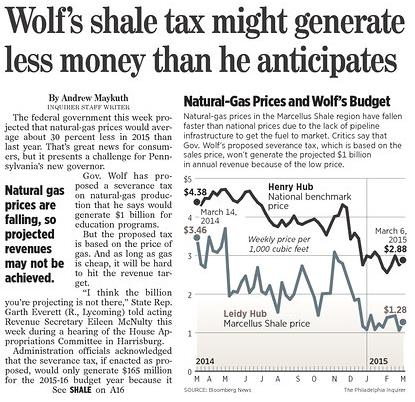As some in Harrisburg work to drastically increase Pennsylvania’s energy taxes – a move that will risk shale’s broad-based positive benefits and strong record of job growth – it is becoming abundantly and increasingly more clear that their math just doesn’t add up. Singling out one subset of an industry – which already generates billions in state tax revenue in addition to the projected $830 million in impact tax revenue alone – with even higher and more onerous energy taxes will undercut Pennsylvania’s ability to compete, grow and further capitalize on the opportunities shale provides, especially as it relates to jobs.
As the MSC’s David Spigelmyer has underscored: “Higher energy taxes on an industry that already generates substantial tax revenue for state and local governments would undercut Pennsylvania’s positioning in the global fight to attract capital investments and stunt this economic momentum rather than fully capitalize on it.”
Against that background, consider these facts:
- HIGHER ENERGY TAXES SLOW DRILLING, REVENUE: States like West Virginia — which some in Harrisburg want to follow – that rely heavily on severance tax revenues, are facing steep budget shortfalls due to declining tax collections. According to the Charleston Daily Mail, the global decline in energy prices is “taking its toll” on the state as “lackluster collections from personal income and severance tax collections” are realized. But depressed global commodity prices aren’t the only, or main, reason that West Virginia’s drilling activity levels – and thus shale-related revenues – are falling. As The Intelligencer reports this week, “West Virginia’s 5 percent severance tax on oil and natural gas production is one of the main culprits driving the number of Marcellus and Utica shale drilling rigs throughout the state down to 17, compared to the 29 working at this time last year.”
- OTHER SHALE STATES WANT PA’s CAPITAL, JOBS: Further highlighting the fierce and highly-competitive global struggle for increasingly fewer oil and gas investment resources, Bloomberg News reports that Louisiana’s Haynesville Shale continues to “Lure Drillers From Marcellus.” Why? Better economics of course. As Bloomberg notes: “Spot gas at the Henry Hub in Erath, Louisiana, traded at $2.79 per million British thermal units Wednesday, compared with $1.65 for Marcellus gas in Pennsylvania at the Dominion North Point/Leidy hub.”
- IT’S MATH, NOT POLITICS: Given the clear pricing differentials – a function of oversupply coupled with limited pipeline capacity across the Marcellus – regional natural gas pricing is overwhelmingly sold at a deep discount relative to national benchmark pricing on the Henry Hub spot price. Why is this important? Well, higher energy tax advocates continue to beat the drum that such policies will yield $1 billion in new revenue. However, these projections – which have been thoroughly debunked by the Associated Press among others – are based on deeply flawed and politically-motivated assumptions that Marcellus gas receives national pricing rates.
While facts and clear-eyed analysis continue to emerge (much more below), one thing is absolutely crystal clear: Higher energy taxes will further discourage capital investment into the Commonwealth and make Pennsylvania less competitive. That means fewer jobs and a stifling of growth that will hit local small business owners, our region’s union building trades and local communities who rely on impact tax revenues the hardest. And as the Pittsburgh Business Times reports this week, in a story focused on energy companies already slowing spending due to the current global market dynamics: “Less spending means less drilling. So it’s not necessarily a surprise that the number of rigs running in Pennsylvania have dropped to their lowest number since summer of 2009.”
TAX REVENUE PROJECTIONS WILDLY OVERSTATED
- “Wolf’s Shale Tax Might Generate Less Money ” Than Claims: Wolf has proposed a severance tax on natural gas production that he says would generate $1 billion for education programs. But the proposed tax is based on the price of gas. And as long as gas is cheap, it will be hard to hit the revenue target. “I think the billion you’re projecting is not there,” State Rep. Garth Everett (R., Lycoming) told acting Revenue Secretary Eileen McNulty this week during a hearing of the House Appropriations Committee in Harrisburg. … A major complication is that Marcellus Shale gas tends to sell at a deep discount to national benchmarks because of the lack of pipeline infrastructure in the shale region to move the gas to market. “For that reason alone, the tax proposal from the administration, the dollars just don’t add up,” said David Spigelmyer, president of the MSC.. (Philadelphia Inquirer, 3/12/15)
 Philadelphia Inquirer front page, 3/12/15
Philadelphia Inquirer front page, 3/12/15
- “Their Estimates, in Reality, Will be Far Less than Half of Their Projections”: MSC president David Spigelmyer said those projections are wildly off-base, given a glut and resulting low price of natural gas in Pennsylvania. “It’s not even close,” said Spigelmyer, who estimated the tax would bring in about $300 million. “Their estimates, in reality, will be far less than half of their projections.” (Tribune-Review, 3/8/15)
- Revenue Projections “Fall Far Short”: Revenue from Gov. Tom Wolf’s proposed natural gas extraction tax — slated to pay for millions in education funding — could fall far short of projections because his estimates are based on higher gas prices in other parts of the country …. “We’ve been saying all along that you can’t get to their budget numbers with these prices,” said David Spigelmyer, president of the MSC. … Senate Republican Caucus spokeswoman Jennifer Kocher echoed those concerns, saying, “We’re not getting anywhere near the projections they are.” … Spigelmyer said the price of natural gas traded on the futures market is linked to prices paid from the Henry Hub pipeline in Louisiana. Pennsylvania drillers often sell gas for much less. (Tribune-Review, 3/5/15)
- Wolf’s Higher Energy Tax Proposal Represents Nation’s “Highest Tax on Drillers”: [MSC’s] Spigelmyer said the price the Wolf administration assumes in its budget is a snapshot price using data that doesn’t represent what Pennsylvania drillers are consistently getting right now. … Spigelmeyer said with the current prices, the effective tax rate for the proposed severance tax is around seven or eight percent, which, with Pennsylvania’s other business taxes, would represent the highest tax on drillers in the country. The impact fee and the severance tax are both to be levied during 2016 – for just that one year, and then only the severance tax – making the effective tax rate on drillers in 2016, if natural gas prices remain as low as they are now, 10 percent or more. Spigelmyer said that would easily be the highest tax rate in the country, even without the state’s other business taxes. (Capitolwire, 3/8/15)
- “The Administration’s Estimates Are Unrealistic”: The administration’s estimates are unrealistic, countered David J. Spigelmyer, president of the MSC. He said Wolf is not taking into account the drop in Marcellus Shale gas prices, which the U.S. EIA says is based on the region’s lack of pipeline and storage capacity and not enough large industry users. Because Marcellus Shale gas prices have dropped, he said, the Henry Hub index, which is centered in Louisiana, is no longer a reliable price gauge for Pennsylvania’s gas market. “There is absolutely no way in the Appalachian [gas market] you get Henry Hub prices, and we won’t get the Henry Hub prices until we get major infrastructure built out in Pennsylvania,” Spigelmyer said. … If prices remain the same this year, the only way Wolf could hit his $1 billion mark is if drillers increase gas production by 28 percent or more, The Morning Call found. (Allentown Morning Call, 3/7/15)
HIGHER ENERGY TAXES THREATEN PA JOBS
- “Whopping Big Tax” on Energy = Less Drilling, Fewer Good-Paying Jobs: MSC’s Spigelmyer argues that the severance tax would punish a business that has been one of the few growth industries in Pennsylvania during the years following the 2008 recession. … In a low-price environment, natural gas drilling companies are slowing production. … “If you’re going to put a whopping big tax on gas, you’ve got to know you’re going to see less drilling,” said Spigelmyer. (Philadelphia Inquirer, 3/12/15)
- Pa. to “See Significant Capital Reductions” with Even Higher Energy Taxes: [MSC’s Spigelmyer] said because of the low gas prices, the state has seen a significant decline in the number of active drilling rigs (that are drilling wells) – 138 in 2012 to less than 50 today – and raising the cost of doing business in Pa. will prompt a further reduction. “We’ve already seen pretty serious capital reductions in Pennsylvania … and you would see significant capital reductions in Pa. if you add an 8-percent tax to the mix,” said Spigelmeyer, adding that just one year with both an impact fee and severance tax would make the industry “react very quickly” to reduce its drilling activity in the state. “And when the number of wells you’re drilling declines, you’ll start to see less gas produced in Pennsylvania,” he said. (Capitolwire, 3/8/15)
Take action today to stand with working families, local communities and small businesses across Pennsylvania in our efforts to protect jobs and economic opportunity for generations to come.





